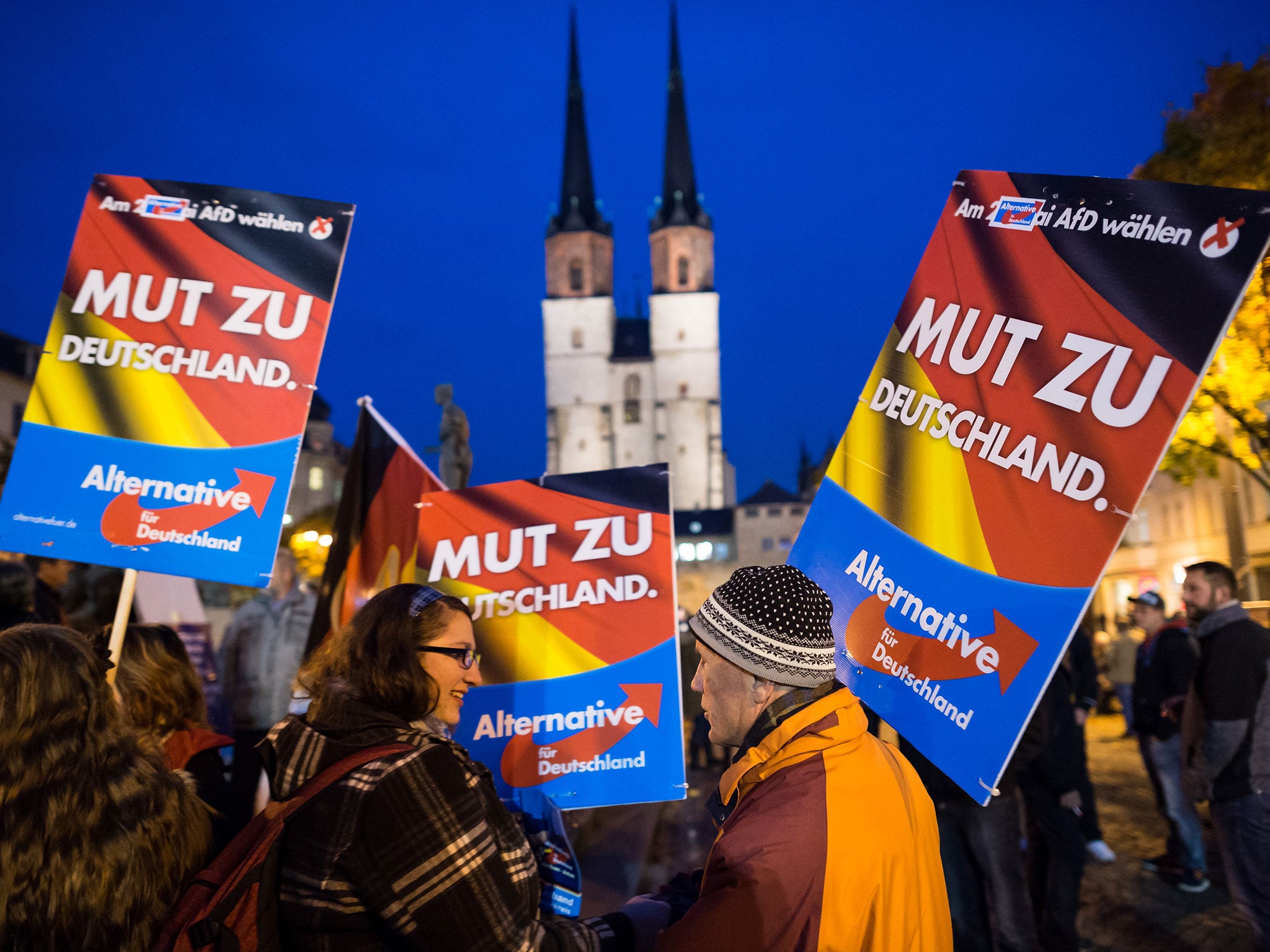Far-right party set to become Germany's third largest political body, new poll reveals
The Alternative for Germany, which has stirred controversy for its members’ attitudes to the Nazis, takes an anti-immigrant stance

Your support helps us to tell the story
From reproductive rights to climate change to Big Tech, The Independent is on the ground when the story is developing. Whether it's investigating the financials of Elon Musk's pro-Trump PAC or producing our latest documentary, 'The A Word', which shines a light on the American women fighting for reproductive rights, we know how important it is to parse out the facts from the messaging.
At such a critical moment in US history, we need reporters on the ground. Your donation allows us to keep sending journalists to speak to both sides of the story.
The Independent is trusted by Americans across the entire political spectrum. And unlike many other quality news outlets, we choose not to lock Americans out of our reporting and analysis with paywalls. We believe quality journalism should be available to everyone, paid for by those who can afford it.
Your support makes all the difference.A far-right anti-immigration party is on course to become the third largest party in Germany, according to a new poll.
The Alternative for Germany (AfD), who enjoyed an unprecedented surge in last year’s local elections, is predicted to win 10 per cent of the vote in the election this September.
According to the poll published by Insa and Bild on Tuesday, this will put them in third place directly behind the Social Democrats (SPD) on 25 per cent and Chancellor Angela Merkel’s Christian Democrats (CDU) on 37 per cent.
The AfD, which has stirred controversy for its members’ attitudes to the Nazis, was originally founded as a Eurosceptic party in 2013. Since then, it has monopolised on anti-refugee sentiment in the country by attacking Ms Merkel’s decision to open Germany’s borders to Syrian refugees in 2015.
The poll found the populist nationalist party are only ahead of their competitors by a fraction. The pro-business Free Democrats (FDP) and Die Linke (The Left Party) are predicted to win nine per cent of the vote.
If the AfD were to become the third largest party in the Bundestag in the forthcoming elections on 24 September it would drastically change the German political landscape. The CDU and their Bavarian sister party the CSU have stockpiled conservative votes throughout the postwar period.
It would also signal a massive cultural and ideological shift. The AfD has capitalised on the fact celebrating German identity has remained taboo since the Second World War – with standing for the national anthem and waving flags frowned upon - by embracing an unapologetically nationalist agenda.
It has also taken an explicitly anti-Islam approach and has contacts with the far-right anti-islam Pegida movement. It previously adopted some of Pegida's anti-press rhetoric such as the slogan "Luegenpresse", meaning "lying press", which mirrors Nazi Germany.
Frauke Petry, who is party chairman of AfD, in the past said German police should "if necessary" shoot at migrants attempting to enter the country illegally.
Spurned by the German mainstream left-wing and conservative, the AfD has been hit by a slew of public controversies. Earlier in the year, it was embroiled in a scandal over its attitude toward Hitler's Third Reich during which over six million Jews were murdered.
Björn Höcke, a senior member of the party who has denied Adolf Hitler was "absolutely evil", prompted outrage after appearing to attack Berlin’s Holocaust memorial while calling for the country to take a more "positive" attitude towards its history.
“Germans are the only people in the world who plant a monument of shame in the heart of the capital,” he told supporters in Dresden which is the home of Pegida movement earlier in the year.
The remarks were believed to refer to Berlin’s Holocaust memorial which commemorates the Jewish victims of the Nazi regime with five acres covered with almost 3,000 commemorative blocks. His speech prompted one Left party politician to report him for inciting racial hatred.
After fierce criticism, Mr Höcke, who has previously been compared to Goebbels for remarks including claims that Africans are "fundamentally different" to Europeans, released a statement saying any suggestion he had criticised the Holocaust memorial was “a malicious and deliberately denigratory interpretation of what I actually said”.
“In my Dresden speech I wanted to ask how we Germans look at our history,” he said, adding there were other elements to German history as well as guilt, such as composers and poets.
Join our commenting forum
Join thought-provoking conversations, follow other Independent readers and see their replies
Comments